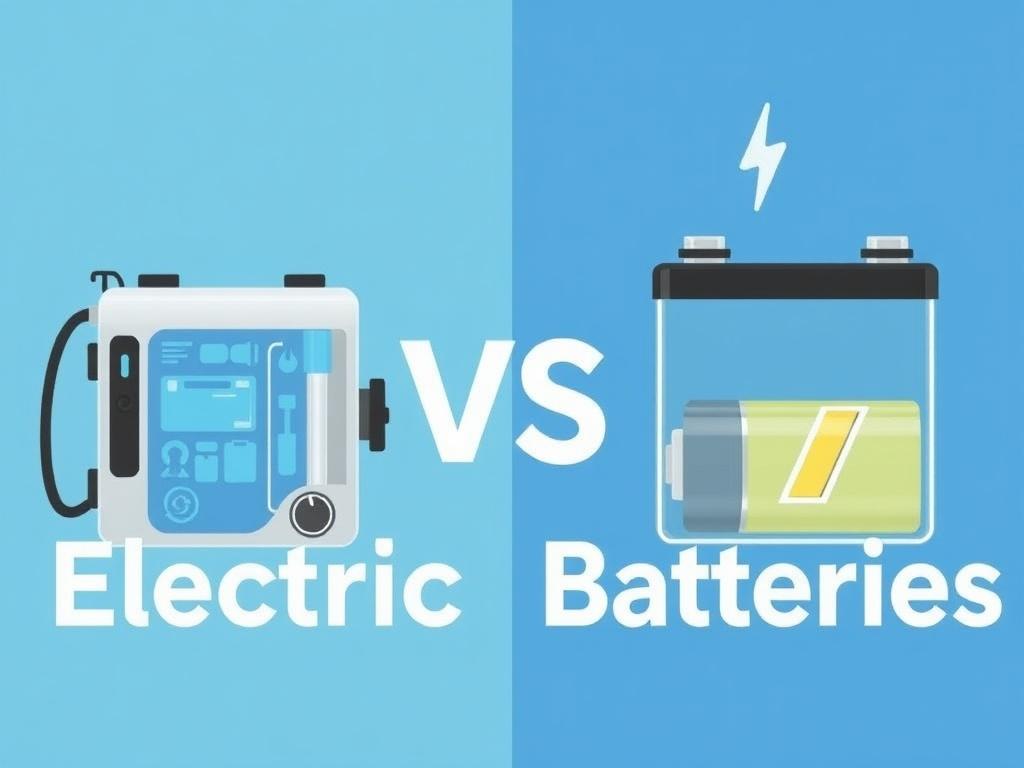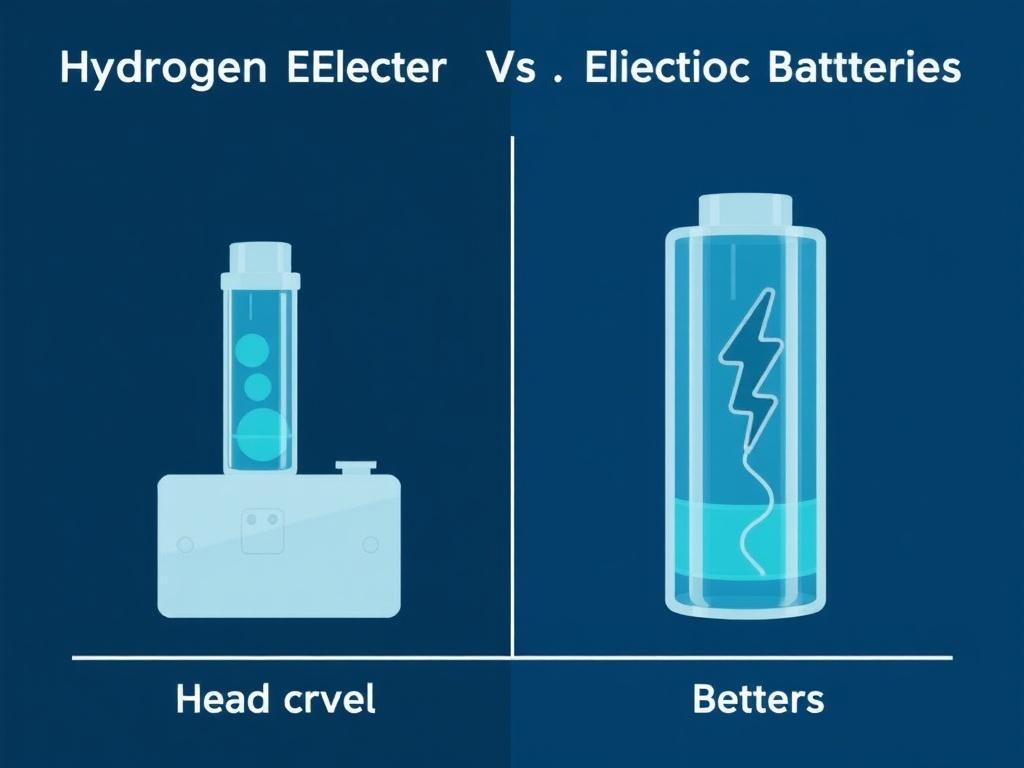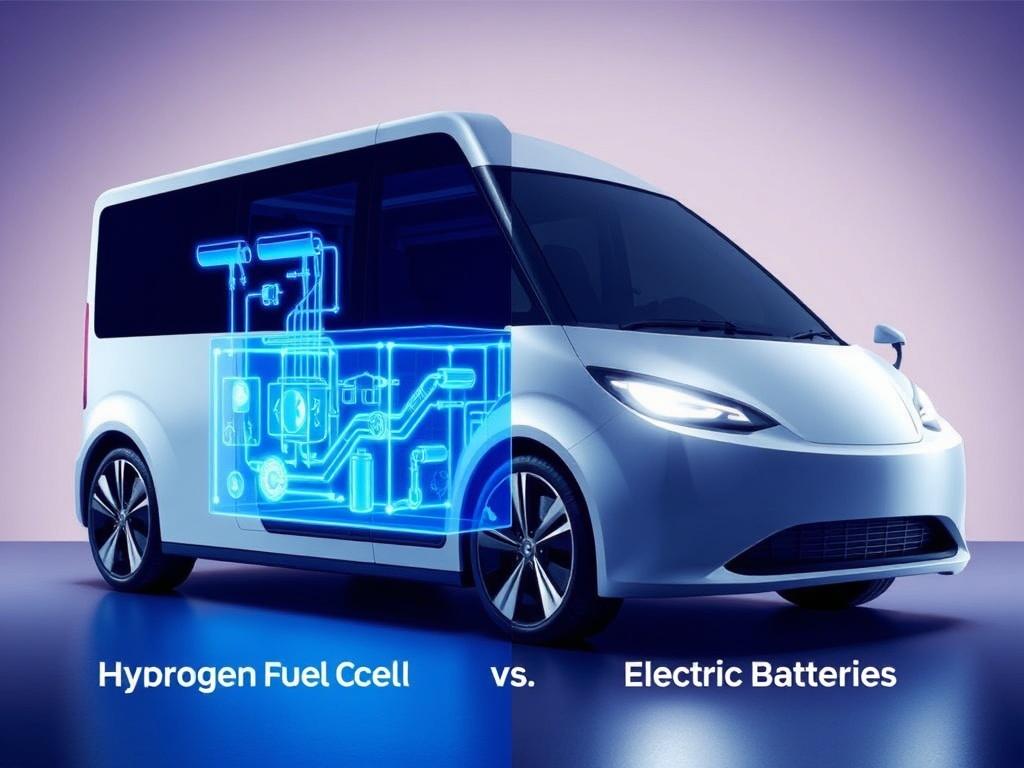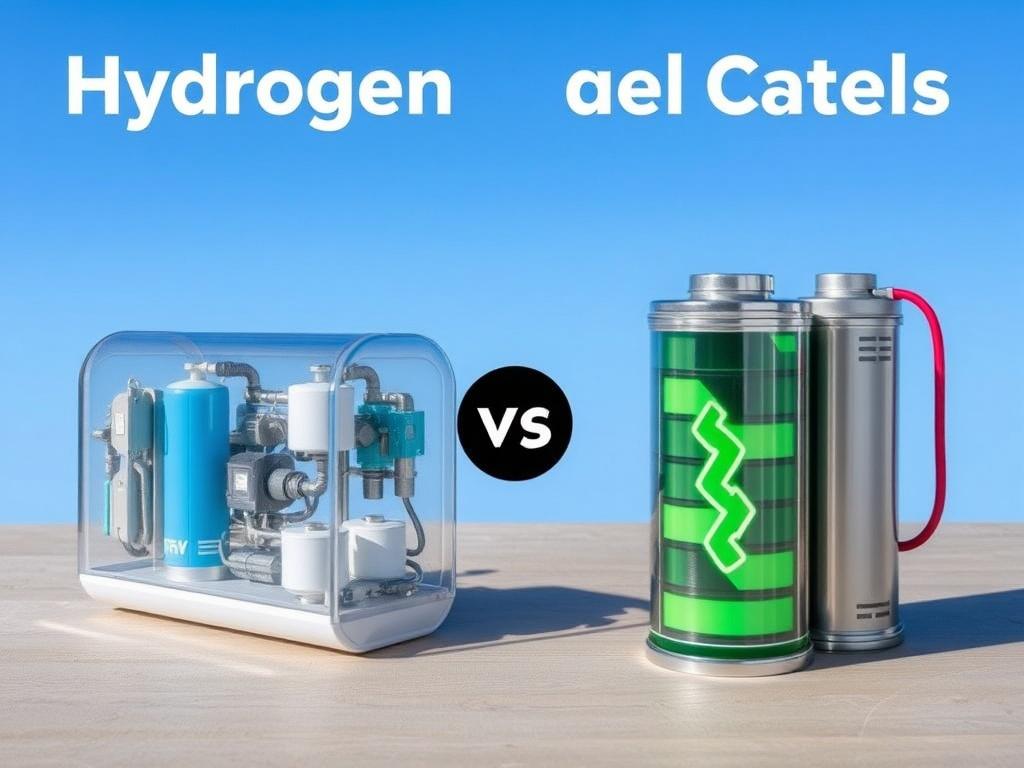- Introduction: The Race for Clean Energy
- How Do They Work? Breaking Down the Basics
- What is a Hydrogen Fuel Cell?
- Hydrogen + Oxygen → Electricity + Water + Heat
- How Do Electric Batteries Work?
- The Pros and Cons: Hydrogen Fuel Cells vs. Electric Batteries
- Advantages of Hydrogen Fuel Cells
- Challenges of Hydrogen Fuel Cells
- Advantages of Electric Batteries
- Challenges of Electric Batteries
- Comparing Hydrogen Fuel Cells and Electric Batteries Across Key Metrics
- Real-world Applications: Where Are These Technologies Being Used?
- Hydrogen Fuel Cell Vehicles
- Electric Battery Vehicles
- Addressing Common Misconceptions about Hydrogen Fuel Cells and Electric Batteries
- The Road Ahead: What Does the Future Hold?
- Factors to Consider When Choosing Between Hydrogen Fuel Cells and Electric Batteries
- Innovations and Emerging Trends
- Hydrogen Advancements
- Battery Breakthroughs
- Hybrid Approaches
- Summary Table: Hydrogen Fuel Cells vs. Electric Batteries
- Conclusion
Introduction: The Race for Clean Energy
The quest for clean, sustainable energy is more urgent than ever. As concerns about climate change and pollution grow, two technologies have emerged as leading contenders to power the future of transportation and beyond: hydrogen fuel cells and electric batteries. Both promise to reduce our dependence on fossil fuels and curb harmful emissions, but they do so in very different ways. Understanding the differences between hydrogen fuel cells vs. electric batteries is essential not only for industry experts but also for consumers trying to decide what the future might hold for their vehicles and energy needs.
Hydrogen fuel cells and electric batteries each have unique benefits and challenges. This article will guide you through how these technologies work, where they excel, and the hurdles they face. By the end, you’ll have a clearer picture of which power source might dominate in the years to come—or how they might complement each other. Let’s dive into the fascinating world of hydrogen fuel cells vs. electric batteries.
How Do They Work? Breaking Down the Basics
To compare hydrogen fuel cells and electric batteries effectively, it’s important to first understand the science behind each.
What is a Hydrogen Fuel Cell?
A hydrogen fuel cell is a device that converts the chemical energy from hydrogen into electricity through a clean electrochemical reaction. Unlike traditional combustion engines that burn fuel, fuel cells produce electricity by combining hydrogen gas with oxygen from the air, emitting only water vapor and heat as byproducts. The reaction can be summed up chemically:
Hydrogen + Oxygen → Electricity + Water + Heat
Fuel cells consist of an anode, cathode, and an electrolyte membrane. Hydrogen gas enters at the anode, where it splits into protons and electrons. The electrons travel through an external circuit, providing electric power, while the protons move through the electrolyte to meet oxygen molecules at the cathode. This process produces electricity continuously as long as hydrogen is supplied.
How Do Electric Batteries Work?
Electric batteries, on the other hand, store electrical energy chemically and then release it when needed. The most commonly used batteries in electric vehicles (EVs) are lithium-ion batteries. When charging, electrical energy forces ions within the battery to move and store energy. When discharging, these ions move back, generating an electric current.
Batteries are self-contained units that deliver instant power for varying durations depending on their capacity. Unlike hydrogen fuel cells, they do not generate electricity on demand but rely on stored energy. The chemical reactions inside a battery are reversible, allowing repeated charging and discharging cycles.
The Pros and Cons: Hydrogen Fuel Cells vs. Electric Batteries

Both hydrogen fuel cells and electric batteries have clear advantages and disadvantages that influence their feasibility, cost, and adoption potential.
Advantages of Hydrogen Fuel Cells
- Fast Refueling: Hydrogen fuel cells can be refueled in just a few minutes, similar to gasoline vehicles, providing a big advantage over the longer charging times of most batteries.
- Long Range: Vehicles powered by hydrogen fuel cells often enjoy longer driving ranges due to the high energy density of hydrogen.
- Lightweight: Fuel cells can be lighter than large battery packs, beneficial for heavy-duty and long-distance transport.
- Clean Emissions: The only tailpipe emission is water vapor, making fuel cell vehicles environmentally friendly.
Challenges of Hydrogen Fuel Cells
- Infrastructure Limitations: Hydrogen refueling stations are scarce compared to electric charging networks, limiting widespread adoption.
- Production & Storage: Hydrogen must be produced, often via natural gas or water electrolysis, which can be energy-intensive. Storing hydrogen safely and efficiently remains a technological hurdle.
- Cost: Fuel cells and hydrogen storage tanks are still expensive to manufacture.
Advantages of Electric Batteries
- Established Infrastructure: Electric charging stations are rapidly expanding worldwide, supporting the growing number of electric vehicles.
- Energy Efficiency: Battery electric vehicles (BEVs) tend to be more efficient in converting stored electricity into vehicle movement than fuel cell systems.
- Lower Operating Costs: Batteries require less maintenance and are cheaper to operate over time.
- Renewable Integration: Batteries can store excess renewable energy from solar and wind, facilitating grid stability.
Challenges of Electric Batteries
- Charging Time: Charging large battery packs can take anywhere from 30 minutes to several hours depending on the charging system.
- Weight and Size: Batteries add significant weight to vehicles, reducing efficiency in some cases, especially for heavy transport.
- Raw Material Concerns: Batteries require lithium, cobalt, and other materials that pose environmental and ethical supply chain challenges.
- Degradation: Batteries degrade over time and eventually require replacement.
Comparing Hydrogen Fuel Cells and Electric Batteries Across Key Metrics

To illustrate the differences more clearly, here’s a comprehensive table comparing hydrogen fuel cells and electric batteries on important factors:
| Aspect | Hydrogen Fuel Cells | Electric Batteries |
|---|---|---|
| Energy Density | High (by weight) | Lower (by weight and volume) |
| Refueling/Charging Time | 3-5 minutes | 30 Minutes to several hours |
| Emissions | Water vapor only | None during operation; emissions depend on electricity source |
| Infrastructure | Limited hydrogen refueling stations | Expanding fast with many charging points |
| Vehicle Cost | High due to fuel cell system and tanks | Decreasing but still significant |
| Range | Better for long distances | Improving, generally less than fuel cell vehicles |
| Environmental Impact | Depends on hydrogen production method | Depends on electricity generation and battery materials |
| Usage Suitability | Heavy transport, long range vehicles, stationary power | Passenger vehicles, light trucks, grid energy storage |
Real-world Applications: Where Are These Technologies Being Used?
Hydrogen fuel cells and electric batteries aren’t just theories—they’re already powering real equipment and vehicles around the world.
Hydrogen Fuel Cell Vehicles
Hydrogen fuel cell technology has been embraced by several car manufacturers, particularly for niche markets that require longer range and quick refueling. Toyota’s Mirai and Hyundai’s Nexo are prominent examples of fuel cell EVs available commercially. Moreover, hydrogen fuel cells are gaining traction in public transit buses, trucks, and even trains—where their long-range capability and quick refuel time shine.
In the heavy transport sector, companies developing hydrogen-powered trucks see fuel cells as a cleaner alternative to diesel engines. Additionally, hydrogen can be used for stationary power generation or backup electricity systems in places where fossil fuels are not ideal or feasible.
Electric Battery Vehicles
Electric batteries have quickly become mainstream in passenger vehicles. Tesla sparked much of this enthusiasm, but now virtually every major automaker offers or is developing electric battery vehicles. Cities are introducing electric buses, and companies are commercializing electric delivery vans and bikes.
Electric batteries also play a significant role in renewable energy grids by storing solar, wind, and other clean energy inputs. Grid storage options powered by battery technology help stabilize energy supply as renewable adoption grows.
Addressing Common Misconceptions about Hydrogen Fuel Cells and Electric Batteries
When debating hydrogen fuel cells vs. electric batteries, myths and misunderstandings often cloud the discussion. Let’s address some key ones:
- Myth: Hydrogen is too dangerous. While hydrogen is flammable, modern fuel cell vehicles use advanced safety measures to handle hydrogen safely, much like gasoline vehicles handle petrol.
- Myth: Batteries are bad for the environment. Battery production does present environmental challenges, especially related to mining, but recycling programs and technology improvements increasingly mitigate these impacts.
- Myth: Hydrogen is inefficient. It’s true hydrogen production and conversion involve energy losses, but advances like green hydrogen produced from renewable energy are helping improve overall efficiency and sustainability.
- Myth: Electric cars can’t go far on a charge. Battery technology is rapidly improving, with many electric vehicles now capable of 250-400 miles per charge, and fast-charging networks continue to expand.
The Road Ahead: What Does the Future Hold?
Both hydrogen fuel cells and electric batteries are likely to coexist rather than compete exclusively. Each has unique strengths that suit different applications. The future energy landscape may look like this:
- Passenger Vehicles: Electric batteries will dominate due to better energy efficiency, expanding infrastructure, and lowering costs.
- Heavy-Duty Transport: Hydrogen fuel cells might lead in trucks, buses, trains, and perhaps shipping, where high energy density and fast refueling are crucial.
- Grid Storage and Backup: Batteries will continue growing but hydrogen storage might provide longer-term energy reserve options.
- Renewable Integration: Both technologies can support renewable energy adoption, with hydrogen enabling seasonal energy storage.
Government policy, technology breakthroughs, and market dynamics will shape how quickly each technology advances and gains wider adoption.
Factors to Consider When Choosing Between Hydrogen Fuel Cells and Electric Batteries
Consumers, businesses, and policymakers should weigh several considerations when comparing these power sources:
- Energy Needs: How far and how quickly do you need to travel? Quick refuel time favors hydrogen for long-range applications.
- Access to Infrastructure: Is there a charging station or hydrogen refueling station nearby?
- Cost Constraints: Initial vehicle cost vs. operating cost over time.
- Environmental Priorities: Source of electricity or hydrogen — renewables vs. fossil fuels.
- Vehicle Type: Light passenger car, heavy-duty truck, or stationary power system?
Answering these questions can help determine which technology is better suited for specific scenarios.
Innovations and Emerging Trends

Recent advances indicate a bright future for both hydrogen fuel cells and electric batteries:
Hydrogen Advancements
Research into “green” hydrogen—produced through electrolysis powered by renewable energy—is gaining momentum, potentially solving environmental concerns from traditional hydrogen production. New materials and designs are also making fuel cells cheaper and more durable.
Battery Breakthroughs
Next-gen batteries such as solid-state batteries promise higher energy density, faster charging, and improved safety. Efforts to reduce reliance on rare materials are underway, along with better recycling techniques.
Hybrid Approaches
Some companies are exploring hybrid vehicles that combine battery and fuel cell power, capturing the benefits of both in one system—for example, batteries managing short trips and power spikes, while hydrogen covers long-distance travel.
Summary Table: Hydrogen Fuel Cells vs. Electric Batteries
| Feature | Hydrogen Fuel Cells | Electric Batteries |
|---|---|---|
| Energy Source | Hydrogen Gas | Stored Electrical Energy |
| Refuel/Charge Time | Minutes | 30 Minutes — Hours |
| Infrastructure Availability | Limited | Expanding Rapidly |
| Environmental Impact | Depends on hydrogen production method | Depends on electricity source and battery materials |
| Best Use Cases | Heavy transport, long-range driving, stationary power | Passenger cars, short-medium range, urban transport |
| Cost | Currently high, improving | Decreasing steadily |
Conclusion
The debate of hydrogen fuel cells vs. electric batteries is far from settled, but it’s clear both technologies will play crucial roles in the transition to a cleaner energy future. Electric batteries have surged ahead in passenger vehicle markets thanks to their growing efficiency, affordability, and convenient charging options. However, hydrogen fuel cells offer unmatched advantages for applications demanding quick refueling, long ranges, and lighter energy storage, such as heavy trucks and public transit. As technology advances and infrastructure expands, a complementary ecosystem may emerge where batteries serve everyday urban driving needs while hydrogen powers heavier transport and seasonal energy storage. Ultimately, the race is not about choosing a single winner but harnessing the strengths of both to build a sustainable, resilient, and clean energy landscape. Staying informed about these innovations will empower individuals, businesses, and policymakers to make smarter choices on our journey to a greener tomorrow.
Как вам статья?







